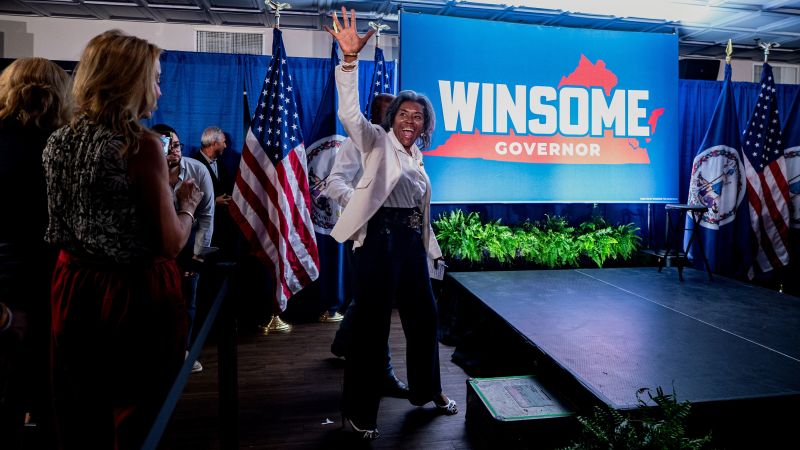In the landscape of the upcoming U.S. gubernatorial elections, attention is drawn particularly to Virginia, where Winsome Earle-Sears, the state’s lieutenant governor, stands as the Republican nominee. At a recent campaign event held in a Filipino restaurant located in a southeast Virginia strip mall, Earle-Sears engaged with a crowd of supporters and friends, discussing her multifaceted identity as an immigrant, a former Marine, and a staunch Christian conservative. This moment crystallized her narrative, one she affirms is a testament to the American dream.
Earle-Sears, echoing sentiments reminiscent of former President Barack Obama, declared, “In no other country is my story even possible.” However, despite the inspirational underpinnings of her background, her ambition to become Virginia’s governor has encountered skepticism within her own party. Many Republicans have voiced concern regarding her viability in what is anticipated to be one of the most pivotal races of the fall.
Prominent conservative radio personality John Fredericks summed up the mixed sentiments within her party, stating that Earle-Sears possesses remarkable charisma and makes an extraordinary potential governor, yet lamented the campaign’s inadequate organization. He stressed the urgent need for a turnaround in her campaign apparatus to enhance her competitiveness against her Democratic opponent, Abigail Spanberger.
As statistical evidence weighs in her favor, Spanberger has demonstrated significant fundraising prowess, having raised nearly $5 million more than Earle-Sears in the previous quarter. Furthermore, recent polling suggests that Earle-Sears is trailing Spanberger by substantial margins. In response to these challenges, Earle-Sears recently appointed a new campaign manager, indicating a strategic recalibration to boost her campaign’s effectiveness.
Undeterred by her underdog status, Earle-Sears maintains a defiant outlook, likening her current situation to previous campaigns where she faced considerable skepticism, much like Governor Glenn Youngkin did prior to his electoral victory four years ago. She asserted to CNN, “We’re going to win. We’re marching towards victory,” emphasizing her commitment to engage with voters extensively and not take any votes for granted.
Throughout her campaign, she has emphasized economic messages while also taking aim at Spanberger’s record on job creation and her stance on issues such as transgender athlete participation in sports. In what could be interpreted as a broader message to both her critics and opponents, Earle-Sears underscored the need for unity, stating, “We don’t need that. We just need you to get out of our way so we can accomplish things.”
Spanberger’s camp responded coolly to Earle-Sears’ critiques, emphasizing the Democratic nominee’s bipartisan reputation and her commitment to tackling issues that resonate with the needs of Virginians.
Adding to the complexity of the race is the absence of support from former President Donald Trump, whose endorsement could significantly bolster Earle-Sears’ standing among conservative voters. Although Trump’s national unpopularity among independent voters is noted, his continued influence within the Republican base cannot be overlooked. Earle-Sears has publicly critiqued Trump in the past, raising questions about whether his lack of endorsement could dampen enthusiasm among Republican voters.
Political strategist Chris LaCivita, a well-known Trump ally, cast doubt on Earle-Sears’ visibility in the race, demonstrating the growing concern within GOP circles. Nonetheless, Fredericks has called for Youngkin to take a more active role in Earle-Sears’ campaign, arguing that heightened turnout amongst conservative voters in southwestern Virginia is crucial for her chances.
Despite acknowledging the challenges, Earle-Sears and her supporters remain confident in her unique biography as a strong selling point, emphasizing her narrative as a conservative immigrant rooted in faith and entrepreneurship. They cite key accomplishments of their administration, including significant taxpayer savings and the establishment of new businesses, as proof of their effectiveness.
As Earle-Sears campaigned and greeted supporters around the state, opinions were mixed about her electoral prospects. Experts weighed in, suggesting that while she is currently viewed as an underdog, there remains considerable time to shift fortunes, especially given the historical context of political power transitions in Virginia.
In a final noteworthy moment, Ron Taylor, president of the Hampton Roads Black Caucus, voiced appreciation for Earle-Sears, citing her fighting spirit as a positive trait. This sentiment encapsulates the paradox of her campaign – a narrative of resilience amidst skepticism, both within and outside her party, as Virginia prepares for a pivotal election that may very well echo into the future political landscape.











